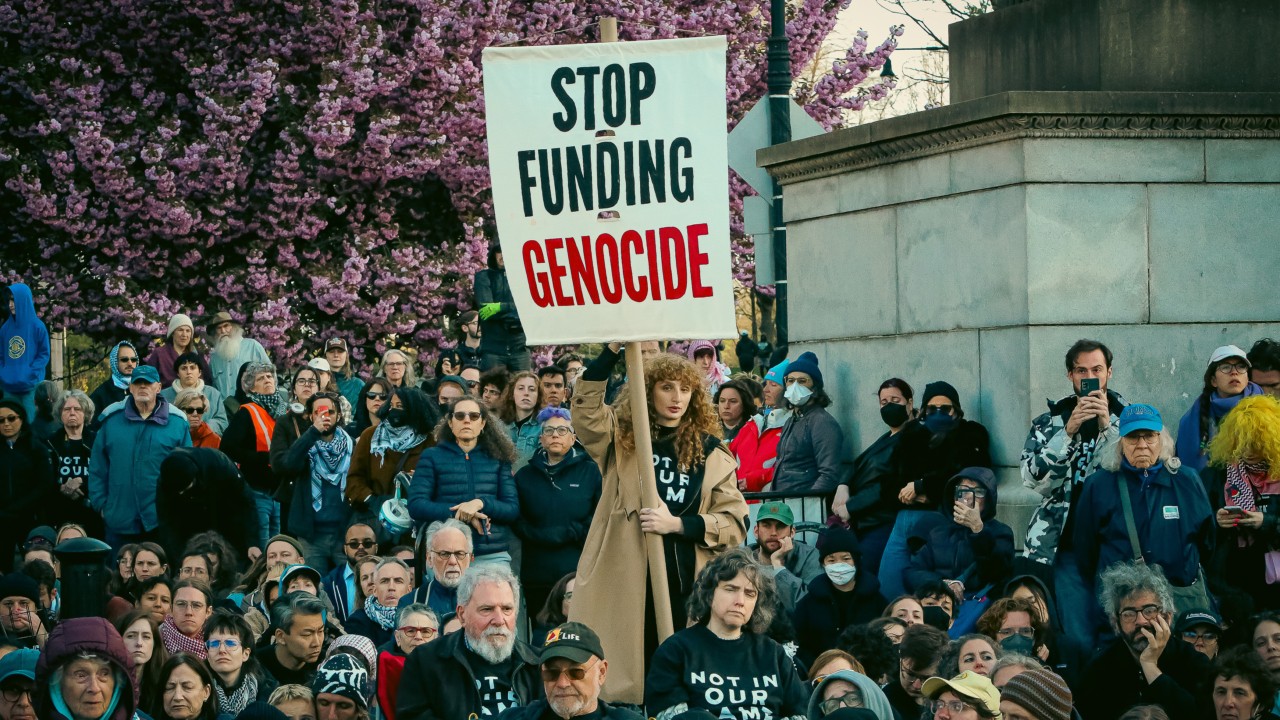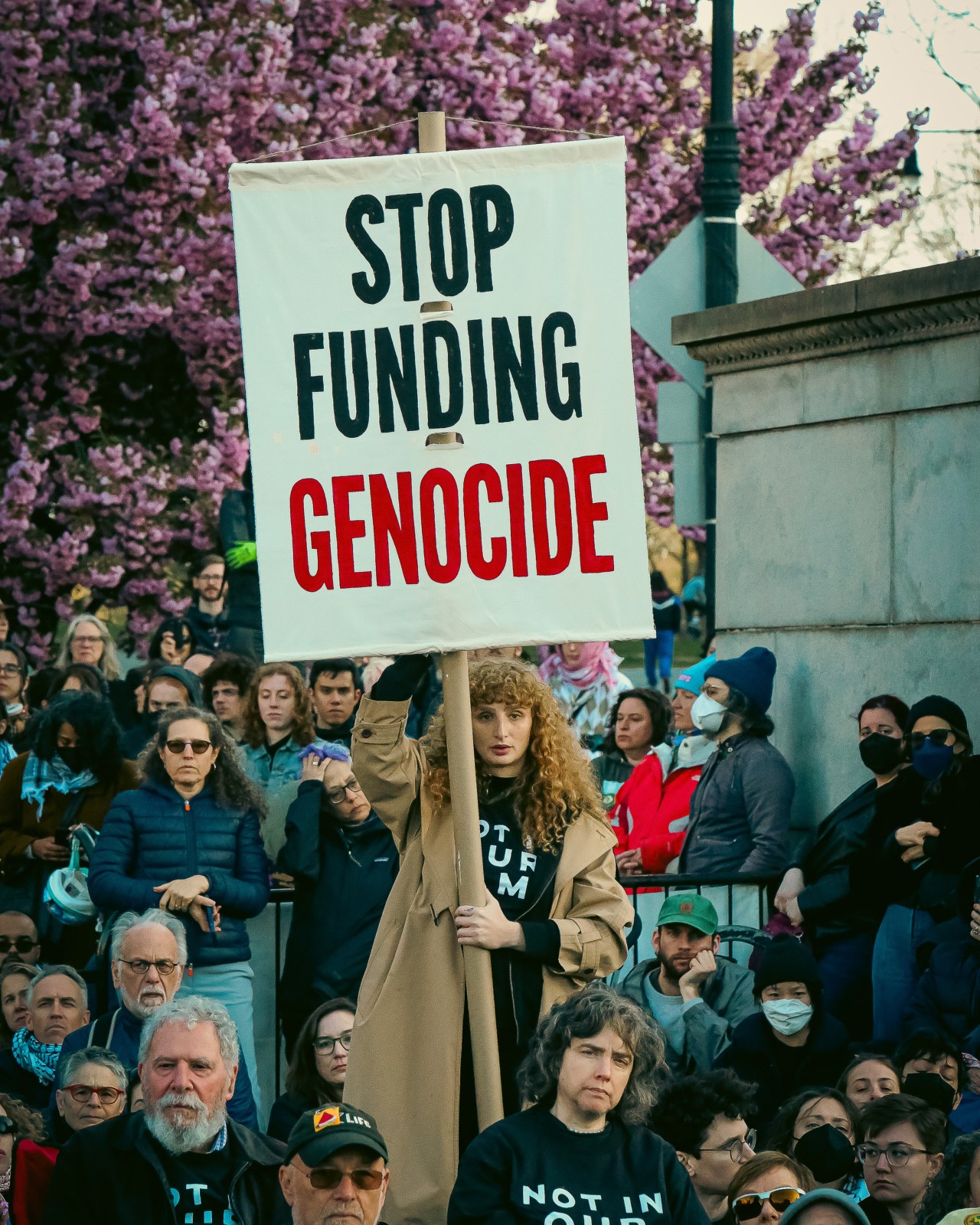

Photograph by Alexa B Wilkinson
Words by Ita Segev
Ita Segev is a transfeminist and anti-Zionist Israeli performance artist, writer, and organizer living in New York. This Points of View article reflects her opinions, not necessarily those of Atmos.
Even with the blessed, though unforgivingly belated, news of a ceasefire and hostage exchange deal, effective January 19, 2025, the ongoing assault on Gaza by Israel and the United States has laid bare the utter disregard for the most basic sanctity of life. We all heard the unrelenting cries of people live-streaming the annihilation of their loved ones; we all saw the hardened hearts of those who had the power to intervene but chose not to; we all witnessed the empty sympathy of heads of state who lit the match, fanned the flames, and drenched the whole world in gasoline.
What do we do with the pit in our stomach, the rage in our chest, after more than a year of witnessing such horrors in Palestine and the region? How do we process the shattering realization that this respite alone will not end the systems of domination that led to this destruction? How can we keep the momentum as the news cycle shifts focus to keep building the necessary movements that dismantle Zionism and all other systems that thrive on domination and preventable mass death?
Palestinian American human rights lawyer Noura Erakat addressed what she describes as the “false demarcation between the ‘over here’ and the ‘over there,’” a mindset that enables some Americans to view events in Gaza as unrelated to those in the United States, during a recent panel at Riverside Church in New York.
Erakat highlighted how—from surveillance technologies to protest repression mechanisms—the American war machine has repeatedly imported methods of state violence that were first experimented with during its imperial wars overseas. These tactics, she explained, have roots spanning U.S. interventions in Puerto Rico, Hawaii, The Philippines, Vietnam, Afghanistan, Iraq, and Palestine. It’s an “imperial privilege,” Erakat said, that leads Americans to believe they can enjoy relative safety while their government hoards wealth and resources through actions that terrorize so many parts of the world.
Erakat’s insights echo dynamics within Israeli society. On the eve of October 7, 2023, many Israelis remained willfully ignorant to the reality that confining millions of people to an open-air prison, carpet-bombed with regularity for decades, is not only cruel and inhumane, but is also an unsustainable foundation for any so-called “secure” nor “peaceful” status quo.
Earlier in 2023, during an argument with a loved one who regularly attended protests against Israeli Prime Minister Benjamin Netanyahu’s authoritarian judicial reform, I criticized the mainstream protests for not acknowledging Israeli racism, apartheid, and the ongoing Nakba as root causes for the nation’s current far-right fascism. He responded: “This is not about that. We are fighting for our democracy. Palestinians will have to wait.”
But just like the violence Israel sought to contain has now burst beyond its borders, and the authoritarian tactics the U.S. exported have now returned to its shores with the re-election of Donald J. Trump, it has become clear that the distinctions deeming some people dispensable and others worthy of protection are illusions, and are inevitably bound to collapse.
We have to allow any good news to restore our faith in the impact of our fight for justice, but our work is far from done.
As intense as these ruptures might feel, they also present opportunities to awaken more people to our shared interdependence; to our kinship.
It is in such moments, that the relationships built between communities and movements over time serve as safety nets. When these nets fail, the gaps reveal the connections we have failed to make and risk perpetuating the zero-sum systems we were trying to dismantle in the first place. For instance, ideological hypocrisies such as being “progressive except for Palestine”, “feminist except for transwomen”, “anti-racist except for the working class” “anti-colonial except for the stolen land I live on” sacrifice some to protect others. Emotionally, a (tempting) kind of “I told you so,” condescends those who are just awakening from the delusions of their safety, dismissing them instead of inviting them into our movements. As a result, they drop through our nets right back to our opposition—who are waiting with open arms.
In her book Doppelganger: A Trip into the Mirror World, Jewish-Canadian author Naomi Klein examines how people, states, and societies project onto others that which they can not bear to face in themselves. In one hauntingly relevant section, Klein charts the ways Adolf Hitler explicitly cited elements from the colonization and genocides carried out by the U.S. and the U.K. against the peoples on Turtle Island and in Africa as “inspiration” for his plans to conquer Eastern Europe and commit the Holocaust. Yet, despite these acknowledgments, the U.S. and Britain never contended with Nazi Germany as a reflection of their colonial legacies. Instead, their fight against Nazi atrocities in World War II allowed them to position themselves as heroes; as oppositional forces to a regime that, ironically, borrowed strategies from their imperial playbook.
When Israel was established in 1948 from the “ashes of the Holocaust,” it too imagined itself as an emancipatory project in response to European antisemitism. In reality, however, Israel was founded on a different continent, built on the ruins of Palestinian villages it destroyed, and grounded in a racial hierarchy imported from Europe—this time with white Jews at the top.
In recent months, Israel’s military actions in Gaza—including death marches and mass graves—mirrored the atrocities that Jews once endured during the Holocaust in Europe. Meanwhile, descendants of Nazis in Germany accuse Palestinians and anti-Zionist Jews resisting genocide of antisemitism, and far-right, pro-Israel, Nazi-sympathizing antisemites in the U.S. are celebrated by Zionists as defenders of Jews. This is the upside-down logic that prevails when moral self-delusion is prioritized over an honest reckoning with reality.
On the left, a similar self-avoidant logic emerges in the attempt to absolve oneself of complicity, instead of collectively working to end systemic harm.
In certain radical circles, this manifests as people speaking for and as the marginalized communities they claim solidarity with, instead of organizing from within their own. This identification with colonized or oppressed people—when not accompanied by the harder work of unsettling and materially transforming relationships to land, resources, and power—can lead to escalated discourse without a material commitment to transformation and repair. It allows people to distance themselves from the communities they are ashamed to be a part of, instead of taking on the work of organizing them. It’s also a mindset that leads to perpetually blaming others—for using the wrong language, for seeking common ground in disagreements, or for employing flawed tools to achieve tangible impact.
Our power is bound in our co-resistance; in people coming together despite their differences to mobilize around the unshakable truth that every single life, from Altadena to Jabalia, is as precious as it is irreplaceable.
Even beyond radical spaces, self-proclaimed liberals often engage in liberation struggles in short bursts dictated by the attention economy. For example, earlier this year, I supported my dear friend, mentor, and godmother of New York City’s Black trans liberation movement, Ceyenne Doroshow, in fundraising for her organization Gays and Lesbians Living in a Transgender Society. G.L.I.T.S supports trans people who are most vulnerable to state violence—they are often Black, Latine, women, poor, unhoused, undocumented, incarcerated, or sex workers. The last major fundraiser for G.L.I.T.S took place in 2020, during the height of the Black Lives Matter uprising. At that time, fundraising goals were met within days. This time, however, we knew it would be harder to garner the same level of support. “But Black and Latina trans women are still dying,” Ceyenne told me—not to discredit the outpouring of collective attention and action in response to the U.S funding a genocide overseas, but as a reminder of society’s tendency to treat the support of marginalized communities as fleeting trends.
This tendency is one we need to be mindful of when it comes to Palestine, especially following news of a possible ceasefire in Gaza. We have to allow any good news to restore our faith in the impact of our fight for justice, but as long as the U.S. continues to arm Israel, as long as war criminals are not held accountable, and as long as Palestine is still occupied and colonized and refugees can’t return home, our work is far from done.
A Shared (and Equal) Empathy
In this era of polycrisis, we can anchor ourselves in the efforts of people resisting all around us. People who believe that a new year, like any demarcation of time, can be an opportunity to find agency in the interconnectedness of our struggles. People who know that collective action is the practice by which we preserve connection to our shared humanity.
For these are the people who uphold the movements we will need to get through 2025; movements that directly support communities impacted by state violence; movements that expand underground networks of care; movements that reallocate funds to where they are most needed; movements that provide healing and sanctuary for those recovering from unthinkable trauma; movements fighting for divestment from systems that profit from mass death.
Committing to a tangible strategy, even if imperfect, and working with others to implement it, is how we build power for these movements. It requires compromise and can be humbling. Yet it might also allow us to not only say we are on the right side of history, but to collectively shape our future.
Our power is bound in our co-resistance; in people coming together despite their differences to mobilize around the unshakable truth that every single life, from Altadena to Jabalia, is as precious as it is irreplaceable. As the world keeps falling apart, don’t let those in power fool you: We are the only safety nets we have.
In 2025, Solidarity With Palestine Means Reckoning With Ourselves First